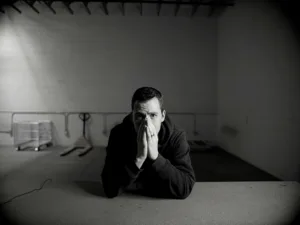Seeking out help can be difficult when you’re struggling. Whether it be shame about the situation, feeling like you don’t measure up or overconfidence that you are better off going at it alone, it’s tempting to just stay silent. This is especially true for men, who pursue therapy far less than women. That first step — asking for help — is often the hardest.
If a man in your life — whether a friend, partner or relative — has come to you for advice on how he can take better care of his mental health, start by giving him props for taking that first step.
Support from loved ones is incredibly important for successful men’s therapy. Keep reading to learn how to support the man in your life on his journey toward improved mental health.
How to Support a Loved One in Therapy
Being supportive sounds simple enough, since after all, you love this person and want to be there for him. But when it comes to mental health, it’s easy to feel overwhelmed and even helpless when there isn’t a quick fix or you can’t just make the sadness, anxiety or hurt go away.
Start by just being there. No one should have to go through hardship alone. Offering a safe place for your loved one to open up and discuss issues he’s having can make him feel secure and connected. You can offer support to a loved one who is seeking or in therapy in several different ways, but according to Psychology Today, the “most important is emotional support.”
Learn alongside him. If you haven’t received treatment from a mental health professional yourself, it may be hard to understand what it’s all about. Or, even if you are experienced in the world of psychotherapy, your partner may be experiencing anxiety about what to expect in therapy. Learn about the process together through internet research or talking to a therapist.
Offer to help. The act of admitting to himself — and you — that he needs help is a big step, but it’s just the first one. The actual task of getting into therapy can be daunting, even paralyzing for some men. If you have the capacity, walk alongside and offer judgment-free help like sharing information on local therapists or support groups. You also can offer to help search for a therapist or drive him to appointments.
Don’t criticize. Mental health struggles can take a toll on a relationship, especially between partners. It can be hard not to feel exasperated or resentful if his method or pace isn’t what you would choose — but keep in mind that everyone’s process is different, and asking for help shows a desire to get better.
Read: Am I Gaslighting my Partner?
Express interest. Once therapy begins, take an interest in what your loved one is talking about in his sessions. Offer space for him to share, but respect his boundaries around keeping quiet as well. Knowing that you are interested and available when he wants to talk has value.
Take care of yourself. Your loved one is going through a lot, but so are you. You might have your own fears and anxiety about your partner being in therapy. You might be struggling to understand the changes he’s making. Having a partner struggling with a mental health issue can be stressful. It can also bring up your own unresolved issues. If you don’t have a therapist, now might be a good time to seek one out.
Health Practices to Supplement Therapy
Psychotherapy is hard work. You and your loved one need to take care of your body, mind and spirit outside of the therapist’s office. These practices are easy to incorporate into your daily life.
Exercise. You don’t need to start training for a marathon, but the mental health benefits of moving your body are widely known. Aerobic exercise like walking, jogging — even gardening — have been shown to reduce anxiety and depression. Even just the act of getting outside can have mental health benefits.
Meditate. The definition of meditation is to engage in contemplation or reflection. You don’t need to be a trained Yogi to find value in meditation. Whether you opt for an app like Headspace or go it alone, reflecting inward can offer you a chance to refocus, relax and cope with stressful situations.
Stay hydrated. You know that water is good for you, but it can be a challenge to stay hydrated. The good news is it’s easy to start — just drink more water! The even better news is, it actually can have a positive effect on your mental health.
Connect. Humans are built for connection. Studies have shown that a lack of social connection can be worse for your health than smoking or high blood pressure. On the flip side, having close social connections can improve your immune system, help you recover from disease faster and greatly improve your mental health. If you’re feeling lonely or isolated, reach out to loved ones for a boost.
Knowing When He Needs Help
Some men are wide open to the idea of therapy while others will avoid it like the plague. Despite the generational shift in perceptions of mental health, too many men are still suffering in silence — sometimes leading to self-harm. Men still die by suicide at a rate nearly four times higher than women. In 2020, the National Institutes of Mental Health found that only 16% of men report any mental health issues in the U.S. Of adults who sought treatment for mental health issues, men made up just 13% in 2019.
Some signs that your loved one is struggling with mental health issues include:
- Sadness
- Anxiety
- Sleep irregularities (sleeping too much or not enough)
- Loss of interest in activities he once enjoyed
- Increased anger or irritability
- Trouble concentrating or completing regular hygiene tasks
- Making unsafe choices, particularly around drugs and alcohol
Read: How to Help a Man get into Therapy
In it for the Long Haul
Psychotherapy isn’t a quick fix, and there will be peaks and valleys throughout the process. Let your loved one know you’re in it for the long haul — and then show up, even when it gets hard. Having your support and encouragement can make a world of difference.














